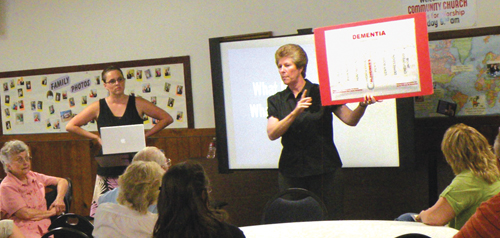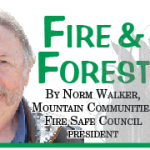A series of four Alzheimer Awareness Seminars, sponsored by the Idyllwild Community Presbyterian Church, began June 22 and continue through July 13.
Shannon Eaton, with degrees in human development and counseling ministries, and Jane Farmer, her co-facilitator, lead the series.
Eaton and Farmer lend personal experience, special expertise and practical suggestions to educate the public about Alzheimer’s and the realm of dementia.
Farmer’s background includes involvement in her own mother’s struggle with Alzheimer’s. Because of her personal experience and training, she is passionate about helping people understand and cope with this fatal disease.
Farmer recounted moving her mother to Desert Hills Memory Care Center in Hemet. “Until that moment, I had been in denial. I swallowed my pride and joined the support group.” Now she and her daughter, Shannon, present seminars about Alzheimer’s to church and community groups.
The introductory topic dealt with “Neurobiology of Dementia.” Both women did an outstanding job explaining the disease in layman’s terms and provided ample time for questions from the many attendees, about half of whom are caregivers.
During the program, some important points were stressed. Alzheimer’s represents 70 percent of the many types of dementia. This progressive and fatal disease is the fifth leading cause of death in the United States. More women than men are afflicted. A person can live eight to 20 years with the disease, depending on their age when diagnosed. Unfortunately, there is no cure.
As tangles and plaque attach to the brain, the neurons are unable to pass communication on to one another. The first symptom is usually short-term memory loss. Shannon was careful to explain this is also a symptom of aging.
Using this analogy, she said, “If you’ve lost your keys and can’t find them, you’re probably okay, but if they’re still in your hand, that’s a problem.”

The second seminar was titled, “Effective Communication.” As the brain deteriorates so does the person’s ability to read and write. Alzheimer’s patients fail to use the right words or give appropriate responses. Their inability to comprehend complex verbal messages is frustrating and unnerving to themselves and their caregivers.
The facilitators explained that communication is 55 percent body language, 38 percent tone and pitch of our voices and only 7 percent is made up of the words we use. Some suggestions they gave about how to communicate with an Alzheimer’s patient are to use more hand gestures, and be very patient in waiting for responses. Remain calm and talk in a gentle manner. Never argue, be condescending or give too many choices.
The third session on Wednesday, July 6, covered “The Grief Process and Spirituality.” The last session on July 13 will be “Care of the Caregiver.”
The seminars are free and open to the public. The church is located at 54400 North Circle Drive.
For further information, email [email protected] or the Alzheimer’s Association alz.org.










